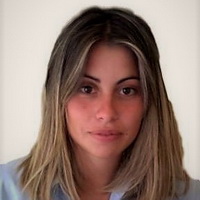Centre of Comparative Law Provides a Home for Italian Post-Doctoral Research Fellow
Maria Sole Continiello Neri, a native of Rome, Italy, recently joined the Centre of Comparative Law at HSE as a Post-Doctoral Research Fellow. While at HSE, she will study Russian immigration law and practice against the backdrop of the European Court of Human Rights. She also plans to study law and ethics of the use of Lethal Autonomous Weapons (LAWs) during armed conflict.
Maria completed her doctoral studies at the Scuola Superiore Sant'Anna in Pisa, where she specialized in International Humanitarian Law and Human Rights Law. She also acquired significant experience in Refugee Law by working in the field with the Italian Red Cross. Alongside her teaching activities, over the coming year she plans to pursue a research project that directly follows from her Ph.D. dissertation, which was aimed at analyzing the interplay between the International Humanitarian Law and International Human Rights Law during military occupations.

Maria Sole Continiello Neri
‘I am really glad to be at the HSE Faculty of Law, and especially to work as a Postdoctoral Research Fellow at the Centre of Comparative Law’, she says. ‘Professor Starzhenetskiy, the chief of my department, and Professor Rusinova, my supervisor, are really supportive in my research and teaching activities. My colleagues and the university staff were really welcoming and supportive, helping me a lot in all the administrative procedures and in integrating me in the academic activities. It is also important to acknowledge the international faculty support unit that helped me step by step in dealing with the lengthy bureaucratic procedures for the visa and work permit, which were the only real difficulties’.
Settling in Moscow
‘Every time I fall more and more in love with this city!’ she exclaims. ‘Its cosmopolitan environment, full of artistic, cultural and intellectual incentives, has always fascinated and conquered my soul. The balance between different populations that melts together makes this city very interesting and attractive. Even the difficulties related to the language are compensated by the kindness of Muscovites who are welcoming and patient with foreigners’.
Maria has been to Moscow three times already, and as a result did not perceive the disorientation of those who have moved to a new place for the first time. That said, she still feels the need to get used to the huge dimensions of the city. Among the the greatest lessons she’s learned by living in Moscow, Maria mentions the benefit of using Google Maps and a map of the Metro, never underestimating traffic, and the importance of dressing in layers.
Despite her familiarity with the cultural and intellectual life of Moscow, she is looking forward to enjoying the abundance of exhibitions, concerts, conferences and meetings that the city offers. Her favorite pasttimes include walks at Chystiye Prudy and Gorky Park, as well as dining at Elarji, a Georgian restaurant.
As for what people can do to prepare to live in Russia for the first time, Maria is quick to recommend books.
‘I will blurt out the recommendation that a friend gave me before I left Rome’, she says. ‘She recommended that I start from the blueprint of the Russian literature: Dostoyevsky, Chekhov, Bulgakov, etc. Even if the places and customs described by those authors have almost disappeared, I think that it is a good way to prepare someone to move to Moscow. And given that I love Chekhov, reading his works is always a pleasure!’
Anna Chernyakhovskaya, specially for HSE News service

